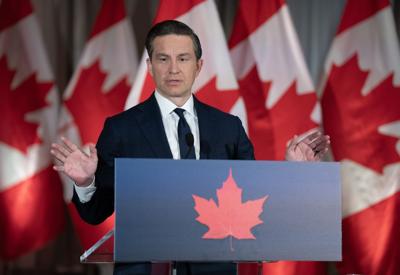OTTAWA—Days after details of the prime minister’s sweeping conflict of interest screen were made public, the federal Conservatives say Mark Carney should sell all of his assets due to a host of potential issues they argue will impede his ability to do his job.
“This will put (Carney) in an impossible position where he will be conflicted at every turn,” Conservative Leader Pierre Poilievre told reporters Monday afternoon.
“Either he will have to get up three or four times every cabinet meeting to avoid stumbling over the 100-plus potential conflicts that the ethics commissioner has identified, or he will act in cabinet to potentially favour his own interests. Neither of those possibilities is acceptable.”
The disclosure, issued Friday by the Office of the Conflict of Interest and Ethics Commissioner, outlines details of the and the he agreed to implement to avoid receiving preferential treatment as a public office holder due to his prior business dealings.
The screen is being administered by Carney’s chief of staff, Marc-Andre Blanchard, and Clerk of the Privy Council, Michael Sabia, “to ensure that I am neither made aware of nor participate in any official matters or decision-making processes involving the Companies’ interests,” Carney’s declaration states.
“I may, however, participate in a discussion or decision on a matter that is of general application or that affects the Companies’ interests as a member of a broad class of persons unless those interests are disproportionate to the other members of the class.”
The filing shows that Carney has agreed to recuse himself from matters tied to more than 100 entities, including investment firm Brookfield Asset Management, its parent company Brookfield Corporation, and payment processing company Stripe.
Carney resigned as board chair of Brookfield Asset Management in January when he entered the federal political scene, and also stepped down from other positions, including another board role at Stripe.
Following his ascension to the top of the Liberal party, Carney also set up two conflict of interest screens for both companies, and put his assets, aside from “cash and personal real estate,” into a blind trust, something the prime minister has argued he did well ahead of the deadline that must be met within 120 days of taking office.
Last week’s disclosure details the myriad investments Carney placed in the blind trust.
It also shows that Carney divided the 103 entities captured by his ethics screen into three categories: 25 entities for which he previously held a management or oversight role, four “Brookfield portfolio companies” that appear in the federal lobbyist registry, and 74 entities included “out of an abundance of caution” because they were identified as being linked to Brookfield, even though Carney “had no role in managing them, and no direct financial interest in them.”
Errol Mendes, a professor of constitutional and international law at the University of Ottawa and a former senior adviser to the Privy Council Office, said that Carney’s third “catch-all category” shows that the prime minister is prepared to come under close scrutiny.
Mendes also said that while he understands opposition concerns about Carney’s assets because they are “one of the most extensive holdings that a prime minister has had,” he doesn’t back Poilievre’s call for Carney to sell off all his investments and hand the cash over to a trustee.
“I don’t think, to my knowledge, that anyone would fully have expected every single prime minister in this situation to completely sell off everything he or she has,” Mendes said.
Robert Shepherd, a professor of public policy and administration at Carleton University, said it’s not entirely realistic to go Poilievre’s proposed route.
“Sure, if you want to be purer than the driven snow, then yes, technically, you shouldn’t own anything, right?” Shepherd said.
He also said he doesn’t put much stock in Poilievre’s argument that Carney’s corporate history would render the prime minister nearly useless in cabinet meetings.
“The opposite complaint would be that he didn’t declare any conflicts of interests or recuse himself. So you can’t have it both ways. You either want the law to bring out conflict of interest — potentially or actual — or you don’t. So which way would Mr. Poilievre like that argument to go?” Shepherd said.
On Monday, government watchdog group Democracy Watch released a statement also demanding that Carney sell his investments, citing the step as the “only effective way to end the serious, unethical and damaging financial conflicts of interest caused by his investments in more than 500 companies.”
The group also called the prime minister’s ethics shield a “loophole-filled, unethical smokescreen.”
The Prime Minister’s Office said Carney has been working closely with the ethics commissioner to not only comply with all of his obligations, but to also “exceed them.”
“All of his investments were placed in the blind trust and all investment decisions are taken independently from him. Furthermore, the vast majority of the securities divested had been held in an investment account managed by a third party, over which the prime minister neither controlled nor directed the selection of the specific investments,” read a statement from spokesperson Emily Williams.
“The prime minister also proactively put in place a voluntary screen to proactively avoid any potential conflicts of interest, with the guidance of the ethics commissioner. In all of his work for Canadians, the prime minister will continue to serve with the highest standards for integrity at all times.”
Error! Sorry, there was an error processing your request.
There was a problem with the recaptcha. Please try again.
You may unsubscribe at any time. By signing up, you agree to our and . This site is protected by reCAPTCHA and the Google and apply.
Want more of the latest from us? Sign up for more at our newsletter page.




























To join the conversation set a first and last name in your user profile.
Sign in or register for free to join the Conversation